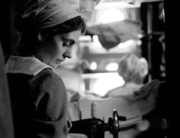Louis Garrel launched his career acting in a film of his father, the celebrated auteur Philippe Garrel. Lately he’s broken out on his own, directing a few modest comedies tinged with melancholy, and his latest, The Innocent, continues in that vein.
Garrel plays Abel, the cautious son of Sylvie, an acting teacher at a prison near Paris. While working with a group of prisoners, she falls for Michel, who only has a short time left in his sentence for robbery. When she giddily tells Abel that she is in love with someone who’s behind bars, Abel recoils from the image of his beloved mother cohabitating with a convict.
Sylvie and Michel are married in a prison ceremony, with Abel reluctantly in attendance. After Michel’s release, Abel ropes his good friend, the free-spirited Clémence, into helping him surveille Michel to see if he is still up to no good. Soon they are part of a robbery that might end badly. Nevertheless, there’s bloodshed, an arrest, and another prison wedding ceremony in store.
The Innocent has all the ingredients of a classic farce as Garrel’s obsessed Abel tries everything he can—even planting a tracker from a dog’s collar inside Michel’s jacket—to find out what’s going on with his mother’s new husband. When Abel and Clémence become inadvertently involved in the heist that Michel has indeed been planning with longtime cohorts, it plays out in a Keystone Kops fashion, albeit with more dangerous overtones.
That crime sequence—which takes up a good chunk of the film in its planning and actual execution—also hints at what’s wrong with The Innocent. By foregrounding Abel’s dispute with Michel, director/co-writer Garrel pushes the relationship between mother and son to the side. It creates an imbalance between an emotional story line of an irrational son and his loving, impulsive mother—a relationship that has an echo in Abel’s mercurial friendship with the headstrong and independent Clémence—and the comedic fallout when Abel can’t handle his mother’s choice of husband.
For all his film’s tonal uncertainty, Garrel has the good sense to let the other actors shine while he underplays Abel’s bewilderment. Roschdy Zem makes Michel more fully formed than the caricatured crook he could have been reduced to. He and Anouk Grinberg, who plays Sylvie with her trademark sensitivity and intelligence, are a believably authentic couple. It’s especially nice to see Grinberg return to the screen—she was director Bertrand Blier’s muse for a few films in the 1990s, but then she disappeared, at least in films seen in America. (She is also formidable as a judge in Dominik Moll’s recent César-winning best picture, The Night of the 12th.)
Speaking of the César Awards (the French Oscars), Noémie Merlant won the best supporting actress honor for her spectacular turn as Clémence, unsurprisingly since awards go to showier performances more often than more restrained turns. But Merlant is so vivacious, funny, and determined in the role that her win is certainly deserved. Garrel again knows enough to smartly get out of her way, especially in a pivotal scene in a diner, as Abel and Clémence pretend to be a bickering couple as a distraction during the caper. It is a masterpiece of overacting by Merlant, who acts the scared and contrite wife with such astonishing gusto that the scene easily becomes the film’s high point.







Leave A Comment